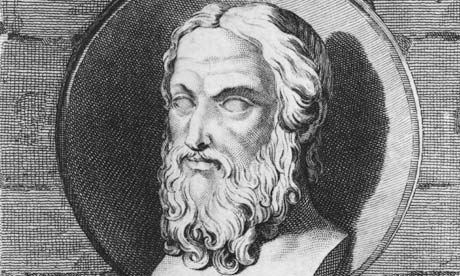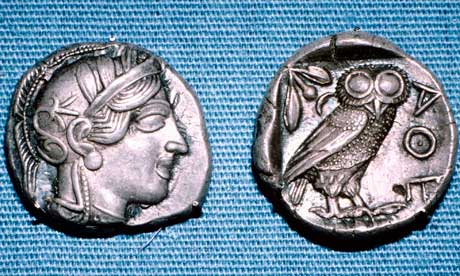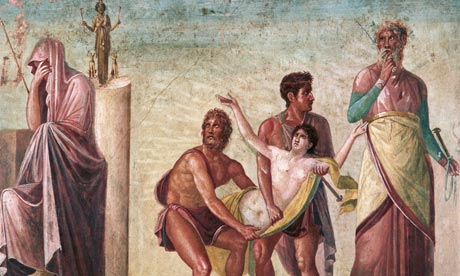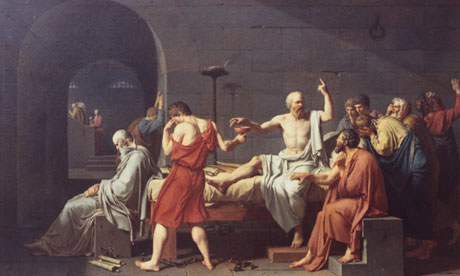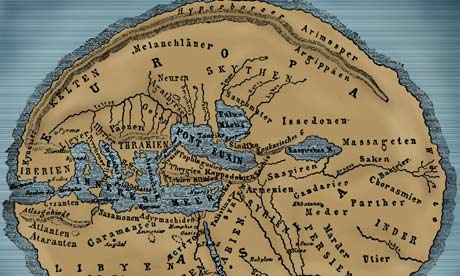Lesson 1: Tactics for engaging in civil disobedience, from Antigone
to Aristophanes
Ancient Greek comic playwright Aristophanes discussed the nature of civil disobedience in Lysistrata. Photograph: Hulton Archive/Getty Images
What do you do if the state imposes what you regard as a blatantly unfair sanction, something that challenges everything that you hold dear?
That is the dilemma faced by the titular heroine of Antigone, Sophocles' play first produced in Athens in about 441BC. She reacts with what we would now think of as an act of civil disobedience.
Just before the drama opens, Antigone's brothers, Polynices and Eteocles, have killed each other in battle.
Polynices has been decreed by King Creon (Antigone's uncle) a traitor to the city, and denied burial on pain of death.
Antigone's response is that Polynices is still her brother: "I will bury him myself / And even if I die in the act, that death will be a glory."
The play questions the limits of loyalty to the authorities, the strength of family ties and the importance of piety.
Things do not go well for any of the characters. Creon duly condemns Antigone to death. Her fiance, Haemon, who happens to be Creon's son, refuses to live without her. For good measure, his mother, Creon's wife, kills herself.
Creon is the last man standing – but utterly broken. Antigone remains a poster girl for defiance against authority.
A more cheerful form of civil disobedience is that practised in Aristophanes' comedy Lysistrata, premiered in 411BC, towards the end of Athens' gruelling war with Sparta.
The heroine Lysistrata persuades the women of Greece to go on a sex strike to bring an end to the war: they swear to forgo such intriguing sexual positions as the "lioness on the cheese-grater".
The men, desperate for sex, agree to terms and the play ends with a song and a dance.
Lesson 2: The first mention of money in classical Greece
Head of Athena on a Greek coin from the 5th century BC, when money became the norm. Photograph: Danita Delimont/Getty Images
The Greeks may have got the idea of coinage from their neighbours across the Aegean in Lydia, but the Greek world was the first society to use money in much the same way as we do – state-issued currency as a universal and guaranteed form of exchange.
Money was probably introduced in the early part of the 6th century BC – and was a wild success.
Its first mention, notes Richard Seaford in his book Money and the Early Greek Mind, comes in the laws written by the 6th-century Athenian reformer Solon, which, prosaically enough, lay down prices to be paid for animals in public sacrifices and standard rates of compensation for injuries. By the mid- to late-5th century BC, the great flowering of Greek intellectual life, money was universal and commonplace.
But it was still a fresh enough phenomenon to cause Greek writers to submit it to some powerful observations, as Seaford also points out.
The Greeks noted its seductive but somewhat suspect universality, the way it can be exchanged for absolutely anything – rather like a prostitute, who will go with anyone. In Aristophanes' comic play Wealth, money is characterised as a force with power over everything. You can have enough of all kinds of things, he writes – music, bread, sex, honour, courage, pea-soup – and yet nobody ever feels they have enough money. A fragment of Solon's poetry reads: "Of wealth there is no limit that appears to men. For those of us who have the most wealth are eager to double it."
Not everybody valued money, however. Socrates refused to be paid for his philosophical teachings. Just as charging for beauty, he argued, is prostitution, so it is that money cannot be exchanged for wisdom.
Lesson 3: family can be murder as well as a dream for a Viennese psychoanalyst
Ancient Roman fresco painting of The Sacrifice of Iphigenia. Photograph: Mimmo Jodice/Corbis
It is no surprise, given the larger-than-life, murderous entanglements of mythical Greek families, that psychotherapists have borrowed from Greek legend to illustrate the archetypes of blood relationships: Oedipus, who slays his father and marries his mother; Electra, who plots with her brother to slay her mother; the god Zeus, who, according to Freud, castrates his father, Cronus. (Freud was mistaken: according to Hesiod's poem Theogony, Zeus in fact confines his father to the depths of Tartarus, whereas it is Cronus who castrates his father, Uranus).
The heroes of Greek mythology often have a complicated family life. Take the Atreides family. To cut a long story (reasonably) short: when Thyestes stole the golden fleece, his brother Atreus took revenge by serving him a delicious meat stew. Then Atreus brought out a platter bearing the heads and feet of Thyestes' children: he had fed his brother his own offspring. It was Atreus's sons Agamemnon and Menelaus who set out to besiege Troy. In order to secure a fair wind for the voyage, Agamemnon sacrificed his own daughter, Iphigenia. When he returned home to Mycenae, his wife, Clytemnestra, and her lover Aegisthus (his cousin) murdered him.
Their son, Orestes, in turn took revenge on his mother by killing her. The cycle of violence ended only when he, pursued by avenging Furies, reached Athens, where the goddess Athena established a trial. The jury was split, but Orestes was acquitted on her casting vote.
To pacify the Furies, she transformed them into the Eumenides, the "Kindly Ones". This latter part of the story, dramatised by Aeschylus, has been interpreted as a metaphor for the rise of Athenian reason and the rule of law.
Lesson 4: As Socrates found out to his cost, teaching brilliant and ambitious youths can be dangerous
The Death of Socrates by Jacques-Louis David (1787). Photograph: Francis G Mayer/Francis G Mayer/CORBIS
In the last years of the 5th century BC, Athens was on the rocks. The Peloponnesian war against Sparta had been rumbling on, unresolved, since 431BC.
In 414BC, the Athenians planned a bold move: anoffensive against Sicily. Before the navy departed, however, two outrages occurred in Athens.
First, there were rumours that an important religious cult, the Eleusinian Mysteries, had been profaned. Second, a shocking act of religious vandalism occurred – sculptures of the god Hermes, hundreds of which stood around Athens as protectors of thresholds, were hacked and mutilated.
These were unpropitious omens for the Sicilian expedition: it ended in defeat for Athens, with almost the entire navy lost and numerous citizens slaughtered.
In the febrile atmosphere after the mutilation of the Herms an anti-democratic conspiracy was feared, and the young, charismatic, handsome, brilliant and desperately unreliable aristocrat and military commander Alcibiades was blamed.
After the Sicilian disaster, in 411BC, democracy was briefly overturned and replaced by an oligarchy. In 404BC, after Athens' final defeat, came another revolution: the reign of terror of the Thirty Tyrants, characterised by mass killings.
After a few months, democracy was restored and an amnesty declared. In 399BC Socrates was tried on charges of impiety and of "corrupting the youth" of Athens. Critias, one of the tyrants, had been Socrates' pupil and friend, as had Alcibiades.
Historians and philosophers still debate how anti-democratic Socrates' teachings were; there is strong evidence that the execution of Greece's greatest philosopher was at least partly an act of scapegoating for the actions of the brilliant, ambitious and often dangerous politicians whom, as youths, he had educated.
Lesson 5: Greeks and others
The world as seen by Herodotus: a 19th century reconstruction of a map dating back to around 450 BC Photograph: INTERFOTO / Alamy/Alamy
We talk about "ancient Greece" and yet this can be misleading: there was no ancient Greek nation state, but rather a collection of numerous independent "city states" or poleis scattered through the Mediterranean from the south of France to the Turkish littoral. What made Greeks Greek, wrote the historian Herodotus in the 5th century BC, was a sense of shared religion, language and customs. On the other hand, the Greek poleis might often be at war with one another; they might have totally different political institutions, even different calendars and names for the months.
Still, Greeks were Greek and the rest were barbarians – barbaroi, those people who speak foreign languages that sound like "bar, bar, bar". Despite that rather binary classification of the world, the seafaring Greeks were vividly interested in the lands beyond. At the fountainhead of Greek literature come Homer's salt-caked tales of Odysseus's fantastical travels.
Herodotus collected travellers' tales from places as distant as the steppes of Scythia and Ethiopa. He reported admiringly on Egyptian culture. He did not really believe in the existence of the Tin Islands (a possible echo of traders' voyages to Britain) but a 4th-century Greek called Pytheas, from Marseille, circumnavigated Britain and wrote about it in his lost work On the Ocean.
Archaic Greece soaked up influence from its neighbours to the east. One of the earliest surviving Greek poems, Hesiod's Theogony, is marinated in Babylonian creation myths. In turn, centuries later, the rising power that was Rome fell in love with Greece (often a rather tough love, as the Roman army reduced the great city of Corinth to rubble) importing and imitating her great art, philosophy and literature.
Lesson 6: Health, and the legacy of Asclepius and Hippocrates
Medicinal baths at Thermopylae, some 90 miles north-west of Athens, Thermopylae meant the Hot Gates in ancient Greek. Photograph: Petros Giannakouris/AP
Homer is the fountainhead of so much in Greek culture, and that includes literary doctors. In the Iliad, Machaon and Podalirius, the sons of the god Asclepius, are Greek warriors famed for their prowess in healing and field surgery. They appear on the coat of arms of the Royal College of Surgery to this day. In the Odyssey, Helen gives her husband, Menelaus, and other war veterans a drug that makes them forget the horrors of the conflict; early treatment for post-traumatic stress, perhaps?
In about 500BC, the cult of Asclepius sprang up in Greece. If you slept in his sanctuary, your dreams might help you find a cure. In the second half of the 5th century BC, a doctor called Hippocrates became celebrated for his skill, and was one of the authors of a number of texts known collectively as the Hippocratic Corpus.
Some of this material reads oddly, to say the least, today. Among the pronouncements are that people who lisp are prone to diarrhoea; that sperm originates in the head and travels down through the marrow before reaching its usual outlet; and that the excessive horse riding of the Scythians makes them impotent. In the Hippocratic text called Airs, Waters, Places, we read that environment has a crucial effect on health. Those exposed to the south wind can expect moist heads full of phlegm, haemorrhoids and, for women, vaginal discharges.
All that said, most of the Hippocratic Corpus favours diagnosis based on observation and is based on the idea that disease is a naturally explicable phenomenon, rather than caused by divine wrath or other supernatural factors. And the Hippocratic oath can be seen as the first statement of medical ethics - doctors are to swear to help and not harm patients, and to honour patient confidentiality.
Charlotte Higgins guardian.co.uk, Sunday 31 July 2011 21.01 BST
What can the Ancient Greeks do for us? | World news | The Guardian
![The [Greek] European Tragedy](https://blogger.googleusercontent.com/img/b/R29vZ2xl/AVvXsEiWKI5s90SFm1wWTk6bs4p7CgslaC2SnYPsrZhb-B-smOufNNCSxCvpBLI9hOB-LsXZjir_PNmEiMk2-E62F3xkg96IoC6QFAaZAnPRTVH340IN9WBRmWJqPkjWlgyRj3zpALp7h6hvA58/s920/GkBack_new.jpg)

